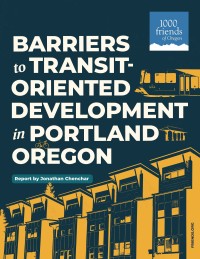The Climate Investment Plan (CIP), just passed by Portland City Council, represents a unique opportunity for Portland to fund climate action equitably. Using excess revenues from the Portland Clean Energy Fund (PCEF), the CIP will invest $750 million over five years across 10 main funding areas. Its comprehensive set of investments is designed to reduce carbon emissions, help vulnerable communities adapt to climate change, and center equity.
PCEF has been working with the community and experts to devise the CIP, and 1000 Friends of Oregon, along with other partners in the Getting There Together Coalition, helped give input early in its formulation, specifically parts of the fund that invested in transportation decarbonization. (1000 Friends also proudly endorsed the PCEF ballot measure in 2018 and has helped serve as a fiscal sponsor to a PCEF grant.) Both community advocates and the Portland City Council came together in strong support of the CIP when it was unanimously passed on September 27.
Climate-specific funds help address unique local climate challenges, enhance community resilience, support local economies through green investments, promote environmental justice, and facilitate meeting climate goals. They also attract additional funding, encourage community engagement, enable long-term planning, and demonstrate leadership in the fight against climate change.
This new fund is thanks in part to PCEF’s dual goals of making climate mitigation and adaptation investments and centering those investments toward black, indigenous, and Portlanders of color, among other groups who have been traditionally underserved by climate investments.
See a full breakdown of the CIP

Why is 1000 Friends engaged in Portland Clean Energy Fund and the Climate Investment Plan?
Land use matters greatly in climate change. Mixed development, transit-oriented design, and other land use reforms can account for a 25 percent reduction in greenhouse gas emissions. These land use reforms are only effective when housing and transportation policies are working together, though. While the CIP’s green infrastructure or community-building funding areas align with our mission, we are particularly focused on supporting transportation decarbonization.

Statewide, and also within Multnomah County, transportation is responsible for over 40 percent of all greenhouse gas emissions, the single-largest emissions category. That’s what makes the CIP’s transportation-decarbonization grants and investment language exciting, especially when incorporating safety infrastructure as led and prioritized by the most impacted communities. Through land use, we can do much more to address climate change at the nexus of housing, transportation, and community needs to help decarbonize our cities. As PCEF continues to evolve, we hope to see land use and the CIP’s transportation investments continue to be essential tools in achieving climate mitigation goals.
What’s next?
Now, as funding from the CIP begins to flow out to communities, we will continue to show up for local funding opportunities that allow us to invest in livability, climate adaptation, and mitigation, and are community-centered.
Want to be notified when we’re involved in work affecting you or your community? Stay informed about the latest land use news with emails tailored to your part of Oregon.
